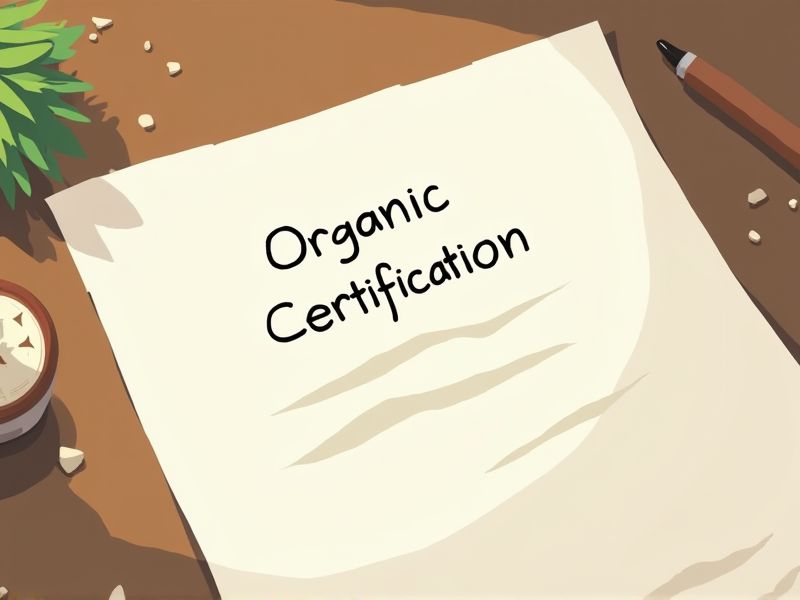
Organic Certification Coordinators ensure compliance with stringent organic standards, necessitating a deep understanding of agricultural practices and regulations. These coordinators play a pivotal role in maintaining the integrity of the organic label, which requires specialized knowledge and skills. Certifications enhance their credibility and provide them with the necessary tools to navigate complex certification processes. These are some crucial certifications that an Organic Certification Coordinator may require.
Certified Organic Professional (COP)
The Certified Organic Professional (COP) designation ensures an Organic Certification Coordinator possesses the requisite knowledge of organic standards and regulations. Certification guarantees familiarity with compliance intricacies, helping prevent violations that can jeopardize an operation's organic status. COP training equips coordinators with problem-solving skills for addressing certification challenges effectively. An organization can maintain consumer trust and market position by employing a COP-credentialed coordinator, which is critical in the competitive organic market.
USDA Organic Certification Training
USDA Organic Certification Training is essential for an Organic Certification Coordinator because it ensures they understand the specific regulations and standards that must be met for organic products. This training equips them with the knowledge to accurately assess and verify the compliance of organic producers and handlers. Through this program, coordinators learn to effectively manage documentation and maintain the integrity of the certification process. Increased familiarity with these guidelines supports their ability to communicate requirements clearly to stakeholders, facilitating smooth certification procedures.
International Organic Accreditation Program Certification
International Organic Accreditation Program Certification provides standardized guidelines crucial for maintaining organic product credibility. Without such certification, Organic Certification Coordinators might struggle with inconsistent organic standards across different regions, leading to consumer distrust. Certification ensures that coordinators possess a thorough understanding of global organic compliance, enhancing the integrity of organic labeling. This fosters increased consumer confidence and market competitiveness for certified organic products on a global scale.
Organic Integrity and Compliance Certification
Organic Integrity and Compliance Certification is needed for an Organic Certification Coordinator because it ensures adherence to established organic standards and maintains consumer trust in organic labels. It provides a consistent framework for evaluating agricultural practices, which helps prevent potential discrepancies or fraudulent activities. By understanding and enforcing these guidelines, coordinators can better support farmers and producers in meeting organic requirements. This certification enhances the credibility of the organic supply chain, fostering increased market opportunities for genuine organic products.
Certified Organic Inspector (COI)
A Certified Organic Inspector is essential for an Organic Certification Coordinator to ensure compliance with established organic standards. This legal compliance builds consumer trust and protects the credibility of organic labeling. Detailed inspections by a COI help identify any discrepancies or violations, thus mitigating the risk of future legal and financial repercussions. Furthermore, employing a COI facilitates continuous improvement in organic practices through expert feedback and recommendations.
HACCP Food Safety Certification
HACCP Food Safety Certification systematically identifies and manages food safety risks, ensuring that an Organic Certification Coordinator can maintain high safety standards. By implementing HACCP principles, the coordinator can effectively prevent contamination and ensure organic products comply with regulatory safety requirements. Certification validates the coordinator's ability to oversee critical control points, thus ensuring consumer trust in organic labeling. It aligns organic practices with recognized safety protocols, enhancing the credibility and marketability of organic products.
ISO 22000 Food Safety Management Systems Certification
ISO 22000 certification ensures that an Organic Certification Coordinator implements a standardized food safety management system, which boosts consumer trust in organic products. This certification helps identify and control food safety hazards, aligning with an organization's organic certification goals. An ISO 22000 framework supports compliance with international regulatory requirements, reducing the risk of food safety incidents. It enhances communication across the supply chain, reinforcing organic credibility and market access.
GlobalGAP Certification
GlobalGAP Certification ensures standardized agricultural practices, which improves consistency and quality of organic produce. It enhances traceability in supply chains, which is crucial for an Organic Certification Coordinator managing organic integrity. Certification aids in mitigating risks related to food safety and environmental impact, aligning with organic standards. Achieving GlobalGAP facilitates market access, enabling coordinators to connect producers with global organic markets.
Good Manufacturing Practices (GMP) Certification
Good Manufacturing Practices (GMP) certification ensures that an Organic Certification Coordinator oversees production processes adhering to safety and quality standards. This certification reduces risks of contamination, which aligns with organic standards that emphasize clean and natural ingredients. It provides a framework for consistent practices, crucial for maintaining the integrity of organic products. By demonstrating competence in managing production facilities, GMP certification builds trust among consumers and stakeholders in the organic product market.
Project Management Professional (PMP) Certification
The Project Management Professional (PMP) Certification equips an Organic Certification Coordinator with robust project management skills, facilitating efficient handling of complex certification processes. By gaining PMP certification, coordinators enhance their ability to manage timelines, resources, and stakeholder communications effectively. The certification instills a disciplined approach to managing risks and ensuring compliance with organic standards. Possessing PMP credentials often boosts credibility and trust among clients and certifying bodies, which is critical in the organic certification industry.
Summary
When you secure certifications as an Organic Certification Coordinator, your expertise becomes more valuable in ensuring compliance with organic standards. This advancement can lead to increased trust from stakeholders and enhance your credibility in the industry. As organizations rely on your certified skills, you may experience expanded career opportunities and potentially higher compensation. Acquiring these certifications often results in more efficient processes and improved outcomes in organic certification projects.
